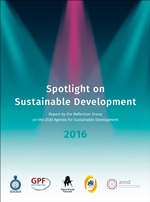Published on Thu, 2016-07-14 23:29
“Leave no one behind” has become a central rallying cry around the UN’s Sustainable Development Goals, but more needs to be done for it to be put into practice, said civil society during a review conference of progress made on the Post-2030 agenda here this week. Unlike the UN’s Millennium Development Goals (MDGs) which failed to address structural inequality, ecological sustainability, and the responsibilities of the global North, the 2030 Agenda acknowledges the “enormous disparities of opportunity, wealth, and power,” as immense challenges to sustainable development – a first for an intergovernmental document. |
Published on Thu, 2016-07-14 22:02
Independent monitoring and review of the 2030 Agenda and the identification of structural obstacles are key factors for the success of the Sustainable Development Goals, argued Roberto Bissio, coordinator of Social Watch, at the launch of the 2016 Spotlight Report at the United Nations. The Spotlight report 2016 is published by the Reflection Group on Sustainable Development, an alliance of Social Watch, Third World Network, ANND and DAWN. The report includes contributions on each of the Sustainable Development Goals (SDGs) by civil society networks and experts and national reports from forty countries. Areli Sandoval, from Equipo Pueblo (Mexico), Juerg Staudenmann from Alliance Sud (Switzerland), Mahinour El Badrawi, from the Egyptian Center for Economic and Social Rights and Maria Victoria Raquiza, from Social Watch Philippines presented the conclusions from their national reports. |
Published on Thu, 2016-07-14 20:59
The Czech Social Watch report launched last week in Prague recognizes achievements by its government in social policies, but also criticizes lack of progress in environmental issues. The Czech Republic supports peace and the Sustainable Development Goals, but on the other hand it stimulates arm exports and blocks developing country participation in international fora on tax havens and illicit financial flows. Although the Government generally supports the SGDs and the engagement of non-state actors in the planning process, some governmental departments fail, or in some cases, even refuse to take seriously the 2030 Agenda for Sustainable Development. |
|
Published on Thu, 2016-07-14 20:47
South Korean society is currently experiencing rising economic inequality, against which Government policy has done nothing to stop. The current regime and the ruling party are distancing themselves from the implementation of the SDGs that relate to economic inequality and democracy. Instead, new laws make it easy for chaebol (mega corporations) to accumulate wealth, while weakening fundamental consumer rights and protections and the new Anti-terrorism Act, adopted in March 2016 includes provisions threatening democracy. |
Published on Wed, 2016-07-13 16:56
As the United Nations High-level Political Forum on Sustainable Development started its first review of the 2030 Agenda for Sustainable Development and the Sustainable Development Goals (SDGs) July 11-20, civil society coalitions from around the world brought to New York their own findings, calling on member states to take note of these. Because the Forum is the UN’s central platform for the follow-up and review of the 2030 Agenda adopted by world leaders on September 25, 2015. It is slated to adopt a Ministerial Declaration to provide political leadership, guidance and recommendations on the 2030 Agenda’s implementation and follow-up; keep track of progress of the SDGs; spur coherent policies informed by evidence, science and country experiences; as well as address new and emerging issues. |
SUSCRIBE TO OUR NEWSLETTER





